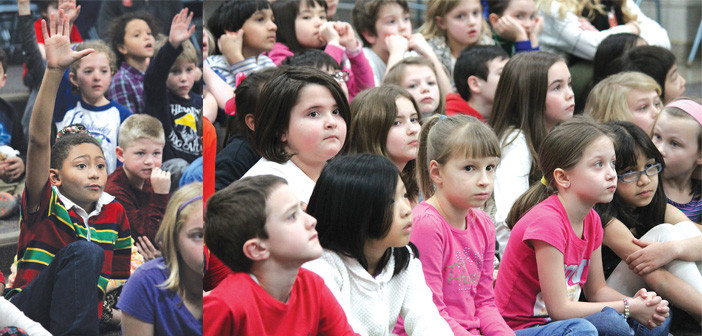By Sarah Colson
“What kind of house did you live in?” “What foods do you like to eat?” “Did you have a swimming pool?” “Are pandas the biggest animal ever where you live?” These were just a few of the questions some thoughtful second graders asked at Towne Acres Elementary last Friday for a first-time presentation by the International Moms Club, a non-official gathering of moms from other countries who live in the Johnson City area.
Dumisa Nyarambi, originally from Zambia, came to speak to the students as way to encourage them to get to know other cultures.
“We’re excited to be here because we’ve made the Johnson City community our home,” she said, “and we feel it’s important for the kids in this community to be aware of how diverse the community is becoming. We want them to feel comfortable when they’re on the playground asking other kids where they are from and then getting to know someone different from them. We are all exposed to American culture and we appreciate it, but it’s very rare that Americans are exposed to one of our different cultures.”
During the presentation, the parents told stories of what it was like in their home countries of China, Japan and Zambia. Each parent showed pictures of where he or she grew up, what the food was like, and his or her experience of applying for citizenship or permanent residency.
Dr. Huili Hong, originally from China, is an assistant professor in the Department of Curriculum and Instruction at East Tennessee State University. She specializes in language, literature, education and society. Her daughter, Victoria, is in second grade at Towne Acres. Hong also came to speak to the students and stressed the importance of a child learning in an environment where he or she feels accepted.
“Immigration is not just some fancy vocabulary word or topic they read in the text,” Hong said. “They will get to hear the live stories of people from all over the world who are living in their community.”
Second-grade teacher Brenda White has been teaching in the area for 13 years. Now at Towne Acres, she decided to get creative with the new Tennessee state standards for social studies.
“One of our new standards was very broad and just said ‘introduce American movements,’” White said. “I chose to plan a unit that incorporated reading, writing and social studies together so the kids could read about immigration then and now. This year I have several international moms in my room. I knew Huili was a professor and she came in one morning and I said ‘I have this idea.’ One of my passions as a teacher is integrating subject areas.”
White asked Hong to be her primary source for the unit on immigration. Now, the duo plans to present to Hong’s teaching class at ETSU about how to best combine different subjects into one lesson plan.
“It takes a little bit more work in the planning stages,” White said, “but it’s more memorable for the students, it’s more hands-on and it also brings a sense of community to the students and to the school.”
White said that as Johnson City becomes more and more diverse, it is important to create a space where students can discuss the differences and similarities they might have with classmates from other cultural backgrounds.
“The face of Towne Acres is changing,” she said. “I want the kids to feel comfortable having discussions about culture and differences and not in a racist or negative way, but just out of curiosity. That’s the biggest thing that we talked about is, how do we make it OK for the kids to say, ‘I can tell we’re different, but let’s talk about our food and our language and our clothes and our parents and our countries’ and it not be taboo.”
Towne Acres Principal Dr. Steve Barnett said he hopes the study of immigration and the international parents’ presentation will help the local students learn more about the 7 percent of his student population who are from outside the United States, and vice versa. He said the international parents provide a great example to second graders about what they can learn from a primary source, instead of just reading about what someone else thinks about a particular topic.
“We have kids here from every continent but Antarctica,” Barnett said. “We try to make sure that they feel very comfortable, that we do all that we can to help them become acclimated to the school, just like we would if somebody moved here from Oregon or California or somewhere else in the country. This is a great way for the students to learn about the experiences that these people had and they can compare and contrast the experiences that immigrants had during different times of our history. People don’t just show up, they have a purpose, generally. The parents that are here today, a lot of times they come here for a job or for education.
“Doing things like this helps students understand their peers better and it has to give the 7 percent of international students a feeling of acceptance.”
For information on the community of international parents, email worldmomjc@hotmail.com.

Dr. Huili Hong (right) with her mother, Shaomei Gao, proudly displaying a tapestry of the Great Wall of China during Towne Acres’ presentation by the International Moms Club. Gao spent two years making this piece and used 400 different kinds of thread.








